

Such behaviors may have even made some laugh. But if you’ve ever witnessed your dog’s trembling in conjunction with out-of-the-ordinary behavior, you know it’s anything but amusing.
What causes a dog to quiver and behave oddly? Is there anything you can do to help a dog who is shaking and acting strangely? When should you take your dog to the vet? When is it natural for a dog to act strangely? Continue reading to discover “strange” habits that your dog is prone to and learn how to correct them.
Do you have a specific question about dog acting weird? Then use the table of contents below to jump to the most relevant section. And you can always go back by clicking on the black arrow in the right bottom corner of the page. Also, please note that some of the links in this article may be affiliate links. For more details, check the Disclosure section at the bottom of the page.
Here's what we'll cover:
Some dogs or breeds are naturally more friendly, but others are timid, shy, and afraid.
These timid and fearful canines may have been abused or too stressed in the past. But suppose your dog usually is a sociable, affectionate pup who has only recently begun to avoid contact. In that case, there’s obviously something else going on.
It’s possible that you’ve been tougher on your dog than you realized while giving them love and attention, and they’re now terrified. Your dog could possibly be stressed out or afraid of something else.
If your dog only acts this way with new people, it’s likely that your dog isn’t yet comfortable with them and will need some time to become used to them.
Also, make sure that people approach your dog correctly when attempting to pet it. Suppose the human lowers their head from above towards your dog’s head. In that case, your dog may interpret this as threatening behavior and become terrified.
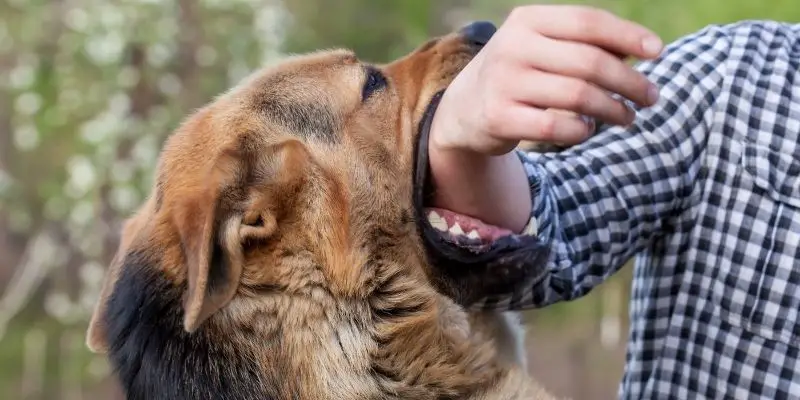
Puppies attempting to bite are common since they are still learning how to communicate. Puppies normally bite during fun or training. But if your little fur baby bites regularly or for no apparent reason, it may be vital to stop this habit before it becomes a problem.
Mature dogs bite out of nervousness, fear, or hostility, so try to figure out what’s causing your dog to bite to stop the biting. Consult your veterinarian if you’re having trouble getting them to stop.
If your dog is generally up for a pet or a hug, pay attention if they start growling or snapping when you get too close.
Growling, snapping, and reactionary actions can indicate pain and discomfort. When a dog ‘acts out,’ people assume it’s a behavior or training issue, but it could be a health-related one.
And most of the time, the health issue is causing them discomfort. A change in this kind of mannerism is particularly crucial to record and keep track of, especially if the dog is being touched or handled in a way that appears to elicit a response. An ear infection, for example, may cause your dog to growl if you pet their head or snap if you brush that side of their face.

If your dog is in discomfort, he or she may refuse to stand up or may struggle to do so. Dogs do not show pain in the way we may imagine. They don’t always weep or complain.
Sometimes the suffering manifests itself in the pet becoming silent, hiding, or not eating well. They may appear tired at times and have an elevated respiratory rate. If your dog isn’t crying or whimpering, don’t assume they’re not in pain.
You’ll be able to recognize a health problem in your dog right away if you’re aware of. And keep an eye out for these indicators, as well as anything else that looks out of the usual for your dog. If your dog is acting strangely or exhibiting any of the signs or symptoms above, contact your veterinarian. Don’t be afraid to bring him or her in for a check-up if the symptoms persist. It’s always best to be safe and have a vet look things over.
It’s not uncommon to witness a dog scooting over the floor, rubbing its buttocks against the ground. However, just because something is ubiquitous does not imply that it is a desirable thing.
This habit is frequently triggered by a problem with your dog’s anal sac, which could be plugged or wounded. Unfortunately, it’s a vulnerable and congested part of your dog’s biochemistry. As a result, this behavior is common.
Allergies, skin irritation from brushing, parasites in the intestines, and damage to the area are all causes of anal sac difficulties that cause your dog to drag its buttocks around the floor.
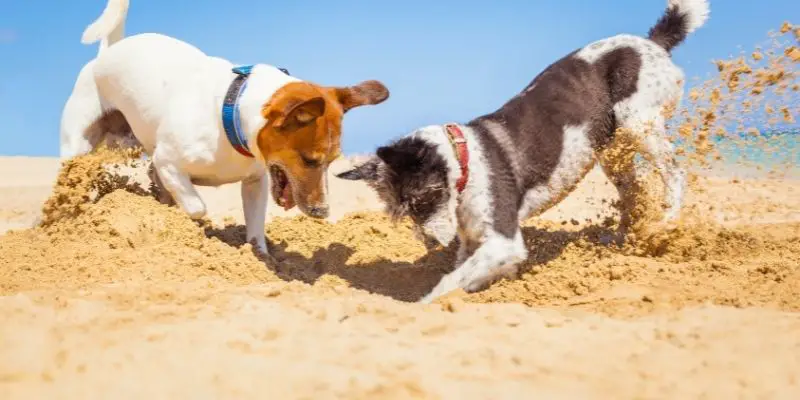
Dogs dig holes in the earth outside for various reasons, including escape from the heat, tracking animals, and hiding something vital to them.
Has your dog begun to dig indoors as well, especially at blankets or couches? Don’t worry. This is totally normal, since your dog may simply be looking for a nice place to lie down. If your dog’s digging is hurting you or causing damage to your furnishings, try talking with a friendly, reliable, competent, and ethical dog trainer.
All dogs scratch and bite at themselves from time to time, so don’t be alarmed if yours spends a few moments biting his foot or scratching his ears. However, if they continue, you should definitely notify your veterinarian.
Scratching can sometimes be a sign of an allergy, fleas, or other problems. However, if they are scratching at their mouth, it could indicate a dental problem. Scratching the side of the mouth where there may be pain and foul breath are some important indicators of dental problems in dogs. If the condition is really unpleasant, they may quit eating entirely. Antibiotics and dental extractions may be required to restore your pet’s mouth to health.
You never know what happened to your dog before it became a member of your family. Many dogs have experienced trauma in the past, which might be triggered by the appearance of a certain object.
Of course, some dogs are simply terrified of particular objects for no apparent reason.
Many dogs, for example, are terrified of vacuum cleaners! This makes sense because vacuums are enormous and loud, and your dog has no idea what it is.
However, if you pull out something that appears to be completely harmless to you and your dog runs away from it, there’s a chance that your dog has been subjected to cruelty involving a similar item in the past.
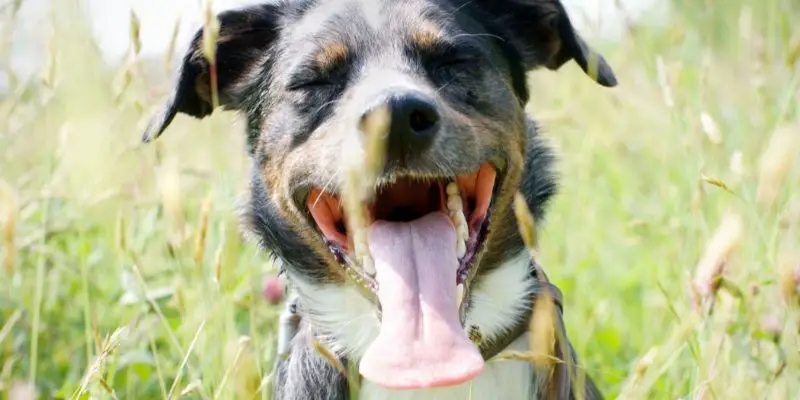
Your dog panting (particularly in the summer) indicates that they are overheating as dogs exhale the majority of their body heat through their mouths to control their temperature.
However, it is critical to pay attention to this behavior because dogs may pant while in pain. Before engaging in any strenuous exercise, make sure your dog is properly hydrated.
It is unpleasant for people, but eating excrement is common dog behavior. Puppies observe their mothers ingesting poop while washing them and may want to replicate this.
However, if it becomes a habit, you should schedule an appointment with your veterinarian. Since eating feces could be your dog’s natural response to a nutritional deficiency that has to be remedied in their diet as soon as possible.
You might always try a reliable, ethical pet brand’s dog-specific Multivitamin supplement!
Correct and correct nourishment, as well as ongoing maintenance, is the key to a happy and healthy dog.
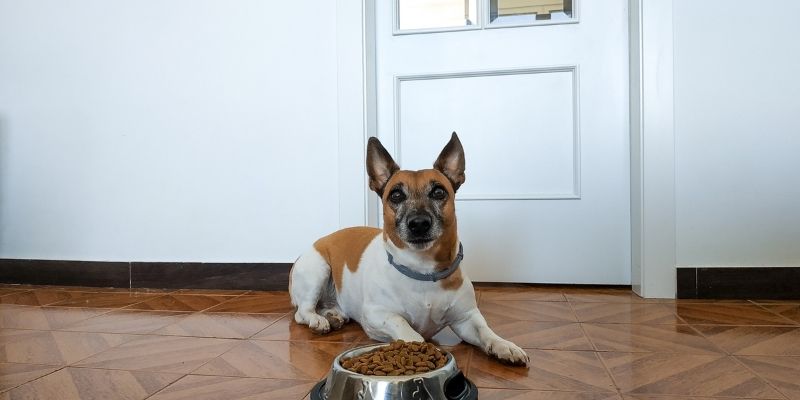
Most dogs are quite food-focused, so it’s important to pay attention if your dog appears to have lost his appetite. Of course, if you switch your dog’s food to something he dislikes, he may turn his nose up and refuse to eat.
If there have been no changes in diet and all other household habits have remained unchanged, you should be concerned. Again, a trip to the vet can discover the underlying cause of your dog’s appetite loss.
Get veterinarian assistance when you see your dog pressing its head against a wall. Because this is a common indicator of many serious conditions, such as brain disease or toxic poisoning. If this is the case, you must immediately take your dog to an emergency veterinarian.
When a dog stops drinking water, it’s usually because they’re under a lot of stress. This could be the result of a recent move or a significant change in your dog’s lifestyle or environment.
If your dog is simply drinking less than expected, this is usually no cause for alarm. When the weather cools down, your dog will likely drink less water and more during hot weather.
On the other hand, if your dog appears to have stopped drinking water entirely, you may be dealing with a significant situation.
If your dog isn’t drinking water at all, something is clearly wrong. Worse, your dog’s refusal to drink can lead to other health problems, and dehydration can set very quickly when the pup refuses to drink.
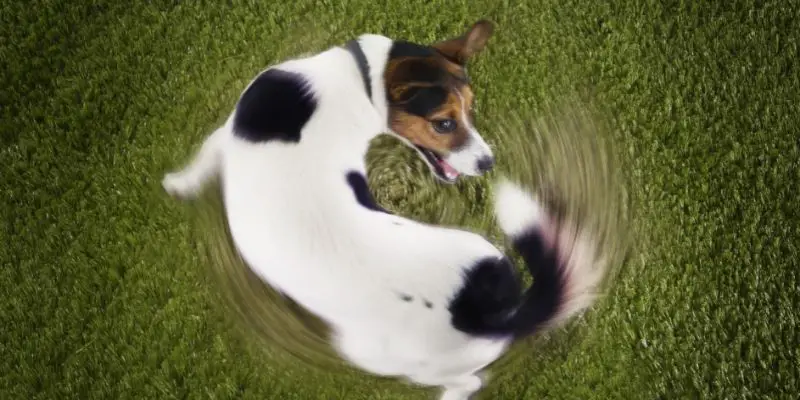
As a dog, chasing your tail must be a lot of fun! However, suppose your pet keeps circling frequently. In that case, it could be a sign of an underlying health problem, such as an ear infection or a headache.
More serious causes include idiopathic vestibular disease (which impairs your dog’s balance) and, in certain cases, a brain tumor. We recommend consulting with your veterinarian if your dog is circling more than usual and does not appear to be actively chasing its tail.
The occasional cough or sneeze is nothing to be concerned about, because dogs cough and sneeze just like people. However, if they are hacking, coughing, wheezing, and sneezing all day, this could indicate disease.
This could be an indication of an infection or a cardiac problem, as well as a variety of other underlying health issues. Some dog breeds are prone to respiratory problems, and elderly dogs are prone to cardiac irregularities. It’s critical to be on the watch for coughing or shortness of breath so that therapy can be initiated to control any illness.
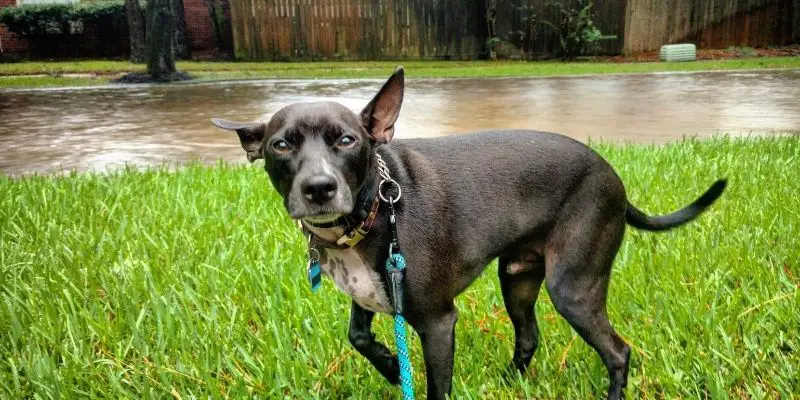
If your dog is shaking or trembling, it is most likely not cold. Overexcitement, nausea, pain, or an underlying condition such as kidney disease are more likely possibilities.
Kidney disease isn’t the only illness that can make your dog shake. Among other things, it could be suffering from distemper or generalized tremor syndrome.
Another typical cause of dogs shaking or shivering is fear. It could even be caused to loud noises outdoors, such as slamming doors or fireworks.
Have you ever observed your dog dragging his or her behind over the floor, especially on rugs? This is known as scooting, and it usually indicates that something is irritating your dog’s anus or that they need to go to the toilet.
However, if poop is not the problem, allergies may be. While it is usual to blame this behavior on worms, this is actually the least likely explanation. Another possibility is that your dog ate grass and is now straining to excrete it.
Provide them with some fiber, such as diced-up cucumber or cooked pumpkin, to help them poop easily. And if this doesn’t help, examine what they may have acquired an allergy to. (Recently altered your dog’s food? Have you been exposed to a lot of grass)? If you have any concerns, always consult your veterinarian.
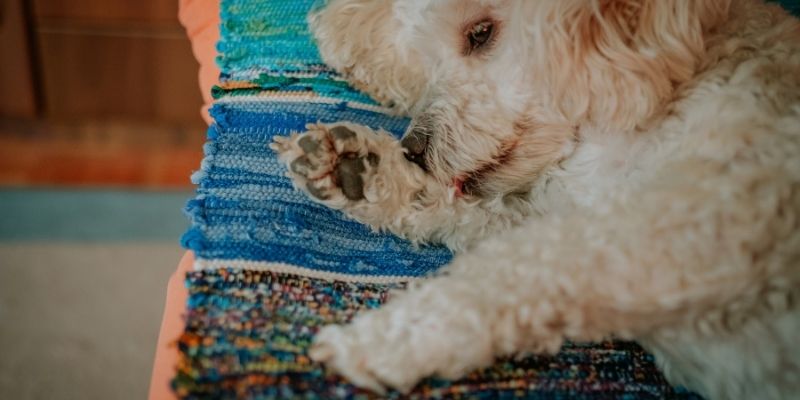
Paw licking is a common action in many dogs, and it is nothing to be concerned about if your dog licks its paws on occasion.
However, there are times when your dog’s paw licking is caused by something more unusual. Allergies or parasites are the most common causes of excessive paw licking since they can make your dog’s paws extremely itchy.
Injuries are another typical cause of paw licking. If you find your dog licking only one paw, it could be due to a cut, abrasion, or even a thorn or cactus spine that has become lodged somewhere in your dog’s paw. Examine the paw thoroughly to see if you can locate any indications of what’s causing the irritation.
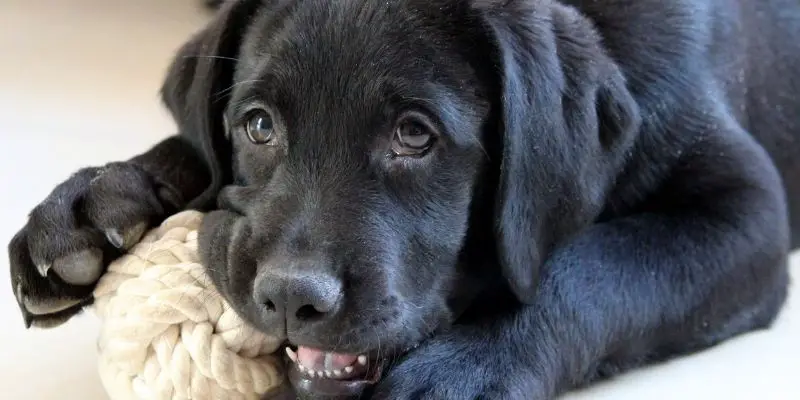
Dogs do not have hands to interact with the outside world. Instead, their primary mode of interaction is through their lips.
As a result, chewing is a widespread and entirely normal behavior in dogs. However, some dogs begin to chew excessively, which can have recognizable underlying causes.
When dogs are hungry, teething, or agitated, they may begin to chew excessively. Separation anxiety can cause a dog to gnaw on anything and everything.
According to a poll of dog owners, anxiety is much more frequent among dogs, with more than 70% of canines exhibiting anxiety-related symptoms.
Separation anxiety affects approximately 14% of dogs, leading to actions such as chewing and damaging furniture.
Another startling sign that your dog isn’t feeling well is when they get overly devoted to you.
Coming over, pawing at you, looking for more attention is sometimes the first indicator of something wrong.
Although cuddling between you and your pup are common, anything in excess is an unusual indicator. Extra affection could be a dog’s way of saying, “Hey, I need help. Something doesn’t feel right.”

Excessive thirst and urination may indicate diabetes. Increased urination, on the other hand, may indicate liver, kidney, or adrenal gland problems.
Housebroken pets may begin wetting inside the house as their urinating increases. For example, a dog who usually sleeps through the night may suddenly require nocturnal toilet trips. An owner may also note that they are filling the water dish more frequently.
In contrast, insufficient urination or straining to urinate frequently indicates a urinary tract issue or bladder stones. These are urgent reasons to visit the vet, especially for cats.
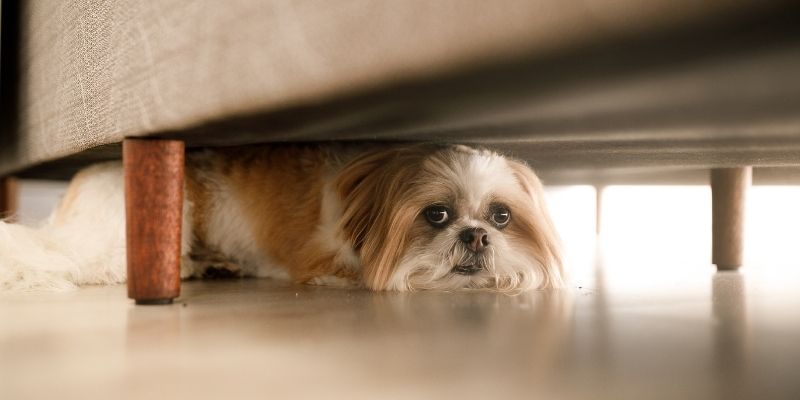
Hiding is a common strange habit you might notice in any dog. They could be in a closet or lurking behind a piece of furniture.
To be sure, some dogs are naturally afraid, and they may frequently hide for safety. However, if your dog has never hidden before and is suddenly beginning to do so, this is obviously abnormal behavior.
If your dog is hiding, it could be because of loud noises, environmental conditions, fear, or the presence of new people and pets in the house.
Remember that a single cause might result in a wide range of unusual behaviors. Many of these behaviors can be symptoms of multiple underlying causes. If you’re stumped and unable to establish the cause of your dog’s behavioral changes, consult a veterinarian for a piece of professional advice.
Thanks for the blog graphics: Canva.com
Thanks for the blog graphics: Canva.com
Doghint.com is a participant of several affiliate programs. The list includes (but not limited to) the following: VigLink, Refersion, ShareASale, and Amazon Services LLC Associates Program, an affiliate advertising program designed to provide a mean for us to earn fees by linking to Amazon.com and affiliated sites. Doghint.com does not intend to provide veterinary advice. All published articles are meant for informational purposes only and not substitute the professional veterinary consultation.

Hi! My name is Ana, and I am the editor of Doghint.com. I am committed to research and publish various information about dogs’ training, nutrition, and the best gear that will make both pup and his parents happy.
Doghint.com is a participant of several affiliate programs. The list includes (but not limited to) the following: VigLink, Refersion, ShareASale, and Amazon Services LLC Associates Program, an affiliate advertising program designed to provide a mean for us to earn fees by linking to Amazon.com and affiliated sites.
Doghint.com does not intend to provide veterinary advice. All published articles are meant for informational purposes only and not substitute the professional veterinary consultation.